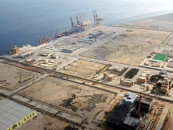As new judicial year begins, superior judiciary to face serious challenges
Outgoing judicial year will also be remembered as toughest for politicians

Supreme Court of Pakistan. PHOTO: AFP
The outgoing judicial year will be remembered as a year during which Chief Justice of Pakistan (CJP) Mian Saqib Nisar not only adjudicated public interest cases but also inspected hospitals in personal visits and held meetings with executive authorities on critical issues such as water and lack of education and health facilities.
The same judicial year will also be remembered as the toughest for politicians, especially those belonging to the PML-N. During this period, senior parliamentarians were not only disqualified, but a few of them were also convicted of attempts to scandalise the court and judges.
The Sharifs were given a tough time during this period – something that was considered unthinkable before the Panama Papers verdict. PML-N leaders believe that remarks by judges severely affected their prospects in the general election.
Since the start of the year 2018, Justice Nisar started focusing on maladministration. All chief ministers and a few ministers were summoned by the apex court. Unlike his predecessors, Chief Justice Nisar did not hesitate from summoning noted political leaders in cases relating to matters of bad governance.
In such cases, former PM Nawaz Sharif was not only ousted as member of the National Assembly but was also disqualified as PML-N head. During the year, three PML-N parliamentarians – Talal Chaudhry, Daniyal Aziz and Nehal Hashmi – were convicted in contempt of court cases. Cases were also registered against a few PML-N and PPP workers for using abusive language against the honourable judges.
Senior lawyers, however, wondered if the punishment in contempt matters could become stiffer for restoring the apex court’s respect.
Senior PTI leader Jahangir Tareen, who filed the constitutional petition against Nawaz Sharif in Panama Papers case, was also disqualified on charges of concealing assets. However, the court rejected a similar plea, seeking Imran Khan’s disqualification over his offshore company, Niazi Services Ltd, and his Bani Gala property.
The apex court fine-tuned jurisprudence on the disqualification clause of Article 62(1)(f) of the Constitution in the outgoing year. Justice Sheikh Azmat Saeed authored a judgment, ruling that the SC could initiate suo motu proceedings to examine the qualifications of lawmakers.
Most experts do not appreciate jurisprudence that evolved after the Panamagate verdict.
Meanwhile, Justice Qazi Faez Isa, in the Sheikh Rasheed disqualification case, also raised serious questions over the jurisprudence evolved in the Panama Papers verdict.
After the PML-N leaders, former president Asif Ali Zardari is now in trouble in a case of fake accounts as the apex court has constituted another JIT to probe the matter.
Challenges
As the new judicial year starts, the superior judiciary is faced with a number of challenges, one of which is religious extremism. Some in the judicial fraternity believe that judiciary is the only bulwark against extremist elements.
Interestingly, Justice Mushir Alam and Justice Isa initiated a suo motu proceeding over the Faizabad sit-in and questioned the performance of agencies in curbing extremists. But even after four months, the case is yet to be fixed for hearing.
The judiciary’s self-accountability has always been challenged: The Supreme Judicial Council initiated proceedings of misconduct against a few high court judges in the outgoing year. When the year started, the CJP had vowed that complaints against judges would be decided by June this year, but almost all cases are still pending.
The process of appointment of judges is yet to improve.
Then there is the need to end the misperception that the judiciary is just targeting civilian leaders, ignoring matters relating to the establishment.
Similarly, missing persons’ case and implementation of the SC orders relating to the military establishment is another major challenge for the judiciary.
CJP’s dams donation drive fails to woo overseas Pakistanis
The SC also has to resolve the matter of pending cases. During the 20-month-long tenure of Justice Nisar, nearly 8,000 more cases have piled up on top of the previous cases.
Over the past five years between 2013 and 2018, pendency of cases has literally doubled. In 2013, there were 20,480 pending cases but this figure had increased to 40,540 by August 15 this year, depicting an increase of almost 100 per cent.
The SC has persistently been calling upon successive governments to improve the service structure in the country.
The CJP’s biggest success this year was to initiate a mass campaign on water shortage and the construction of dams. However, one section of the lawyers raised objections to the manner in which funds were being collected for the initiative. They believe that this violated the ‘trichotomy of power’.
Perhaps, this is the best time for the superior judiciary to give space to the executive and lend a hand to strengthen parliament. If the CJP is able to improve the judicial system in real terms, this would be the best gift he could ever hope to give the nation.



















COMMENTS
Comments are moderated and generally will be posted if they are on-topic and not abusive.
For more information, please see our Comments FAQ